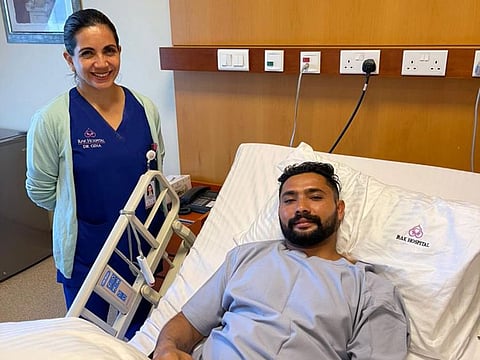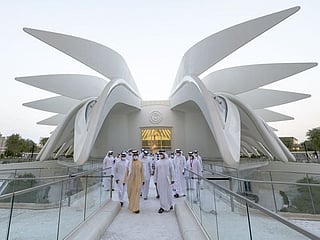Multiple kidney stones removed from 26 year old through rare method in UAE
Kidney stones can cause serious complications if left untreated

Also In This Package
Dubai: When 26-year old Rajinder Singh came rushing to the Urology Clinic of RAK Hospital complaining of excruciating right lumbar pain, a detailed investigation revealed multiple stones in the mid and lower pole of the right kidney and a large 15mm stone in the renal pelvis.
Even though the patient was suffering from the pain for the last eight months, the situation turned critical as the stones increased in size with the biggest one lodging itself in the renal pelvis, hindering the passing of the urine resulting in retrograde swelling, pain and acute distress. An immediate surgery using an advanced technique was performed by Dr Gina Torres, consultant urologist at RAK Hospital, to relieve the patient of the unbearable pain.
New technique
Elaborating on the the innovative technique, Dr Torres said: “Management of patients with complex multiple renal stones have always remained challenging as they pose many risks during the operative procedure such as higher incidence of residual calculus (stone) and multiple tracts requirement.
“Since there were multiple stones of varying sizes, the traditional operative methods wouldn’t have helped. After assessing the situation, we chose to perform the 90-degree PCNL (Percutaneous Nephrolithotomy) in a supine position which is not used commonly in the UAE.”
Dr Torres said, “The position provides a great number of advantages over the previous prone and other positions and is safer for patients with obesity, restrictive lung diseases and anatomical bone and urinary tract abnormalities. Being one of the most natural positions for patients, it allows for all patient anatomical structures to remain in natural neutral alignment allowing better drainage of the kidney while offering easier access for the surgeon and control to the anesthesiologist.”
Less aggressive
Dr Raza Siddiqui, executive director, RAK Hospital said, “Our hospital has always remained at the forefront of bringing new procedures to the country, thus helping the community get world-class care at their doorstep.”
“Additionally, compared to the classic lumbotomy (open surgery), PCNL is a less aggressive technique that facilitates the treatment of large and complex kidney stones. The decrease in in-hospital stay, low analgesic medication and the short period of incapacity for work make this surgical technique well accepted by patients and should be the first option of treatment in such cases,” said Dr Torres.
How kidney stones can impact life
“Besides triggering symptoms such as pain, vomiting and blood in the urine, kidney stones can cause serious medical complications if not treated in time. Complexities can include life-threatening septicemia (blood poisoning), renal scarring and damage causing permanent failure, loss of function leading to the kidney removal, bladder blockage resulting in painful urinary retention,” he added.
Kidney stones are a common cause of blood in the urine and pain in the abdomen, flank or groin. One in 20 people suffer from kidney stones at some point in their life. Even though the majority of stones do pass through urine spontaneously, several factors determine if the stone will pass naturally and these include the size of the person, prostate enlargement, pregnancy, and most importantly the size of the stone. While a 4mm stone has an 80 per cent chance of passage, a 5mm stone only has a 20 per cent chance. The larger stones require certain operative procedures depending on their position, size and other associated complications.
The patient felt relieved after the procedure and started his normal activities from the next day. “I am pain-free and much relieved now as my eight-month agony has ended. Thanks to RAK Hospital, Dr Torres and her team,” said Rajinder Singh.








